In this edition
From the Acting Director of Early Learning
Dear Families
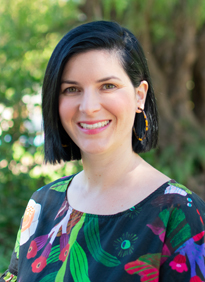
At the conclusion of each term, the teaching team comes together to reflect on the learning and relationships that have occurred, and to discuss the pathway forward for next term. An important component of our reflection has been in reference to our mission for our ELC Learning Communities:
Everyone learning side-by-side as active participants in both teaching and learning, underpinned by mutually respectful relationships and guided by optimism and open-mindedness.
Our ELC community is a place where we care for one another and foster compassion and empathy.
This term, our mission has come to life through the projects that have evolved and flourished. The children have had the opportunity to work across the learning community and engage with a wide range of children and educators. Group investigations have deepened through our Symphony of Languages (SOL) team where children have used the language of creativity to represent their thoughts and ideas. The children have embraced dance and movement as an expressive language where they use their bodies in unique ways to tell stories.
We have continued to use Ferguson Park as a place for discovery, and the children have shown their capacity to connect the skills and learning from one context to another, as they wholeheartedly embrace the ELC Community Garden. They have further developed their ecological understandings by researching the living creatures inhabiting the garden, strengthening their understanding about environmental and seasonal factors that impact the growth of a garden, and the planting process. The garden became a place for the children to imagine what is possible. We have celebrated the children’s connection to the ELC Community Garden as a place where creativity, ecological identity and values are being nourished and promoted. The children are relishing this project, sharing their creative and imaginative representations now and into the future.
Through this project, we have observed the children’s relationships deepen with each other, their learning and their environment. The extended hours team have embraced the afternoons where they can unite the learning communities as a whole, and this has supported the children to value a sense of community.
On behalf of the ELC team, we thank you for a wonderful Term 3 and we look forward to the last term of 2019. Have a safe and restful holiday break.
Kind regards
Kirsty Porplycia
Acting Director of Early Learning
Save the Date
Friday 27 September: Term 3 ends
Monday 30 September: Vacation Care begins
Monday 7 October: Public Holiday – ELC closed
Friday 11 October: Vacation Care ends
Monday 14 October: Term 4 begins
Vacation Care Bookings
Vacation Care begins on Monday 30 September. If you require care for your child and haven’t made a booking, please contact Henrietta Balnaves (Ferguson and Hallett Rooms, 0477 993 318) or Danniella Capaldo (Stonyfell and Bell Yett Rooms, 0477 993 317) as soon as possible.
Please note that the ELC will be closed on the public holiday on Monday 7 October, and Term 4 begins on Monday 14 October.
Welcome Miss Simeonakis to Learning Community 1
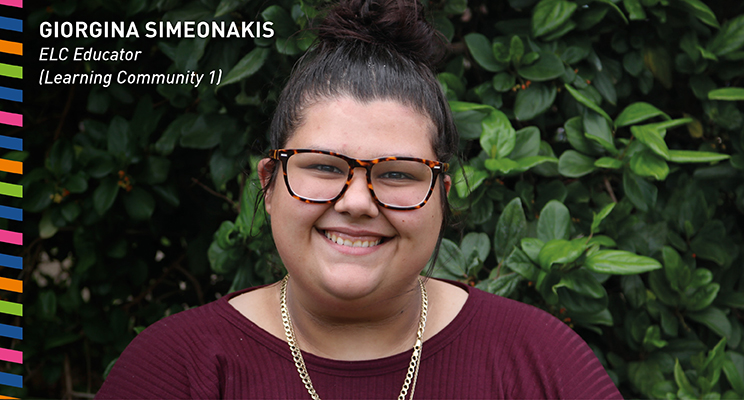
We are delighted to welcome Miss Giorgina Simeonakis to the ELC staff team. She will be working in Learning Community 1, Monday to Friday, from 11am to 6pm. She is a very passionate and bubbly educator who is currently completing her Honours in Early Childhood Education. She has a love of learning and watching children develop and grow in a nurturing and authentic environment.
Miss Simeonakis is settling in beautifully and embracing the opportunity to develop relationships across the Centre. She is looking forward to meeting all of our families and creating strong relationships with you and the children.
Kirsty Porplycia
Planting Begins in the ELC Community Garden
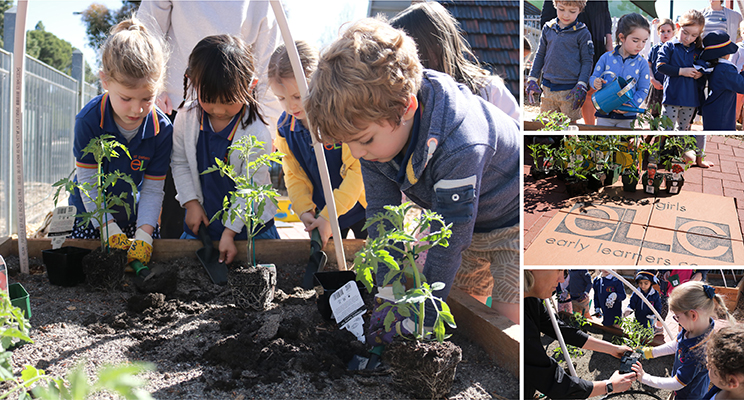
This week the children have begun planting in the ELC Community Garden, joined by family members and volunteers of the Friends of the ELC. Guided by the children’s research, we have begun planting tomato plants and capsicums. The children attending Vacation Care are looking forward to caring for and observing the growth of the plants during the holiday period.
It’s a RAP!
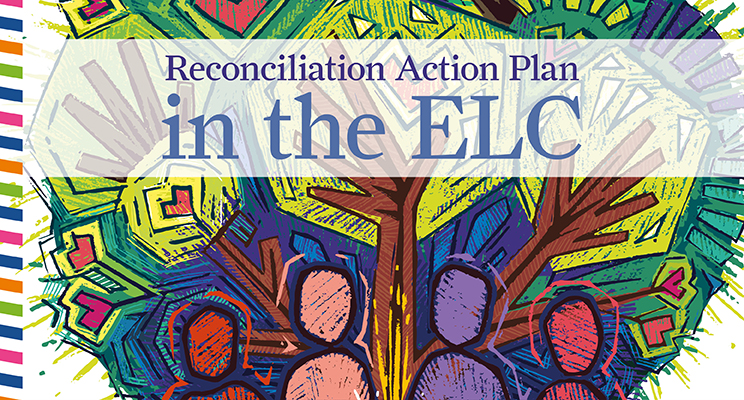
Embedded in the daily practice, at the ELC, we acknowledge and engage in reconciliation. From our Kaurna Welcome to Country, to immersion in activities that celebrate the first peoples, their lands, cultures and spiritualities, we embrace with our friends and the wider community the ongoing relationships we have with Aboriginal and Torres Strait Islanders.
On Monday, we were privileged to have our Reconciliation Action Plan (RAP), a formal document that reflects our commitment to reconciliation, gain approval. The ELC RAP now appears on the Narragunnawali website (click here to view). This site is the nationally-recognised platform for the development of reconciliation in education, and is endorsed by the Australian Government. Our document outlines how we as a Centre will continue to foster relationships, respect and opportunities in the ELC, around the School, and with the community.
Congratulations to all who have played an integral role in getting our RAP approved.
It’s time to celebrate this special achievement.
Lisa Hollis and The RAP Team
ELC Immunisation Policy
Under the Government’s No Jab No Pay policy, families must meet immunisation requirements to receive the Child Care Subsidy. Further information is available from the Department of Health by clicking here.
Children with high risk conditions, as well as children who are not immunised against them, may be excluded from the ELC in accordance with the ‘Staying Healthy: Preventing infectious diseases in early childhood education and care services’ guidelines. Please refer to our Exclusion Policy for further information.
Common illnesses requiring exclusion include:
Influenza
Chicken Pox
Conjunctivitis
Diarrhoea
Hand, Foot and Mouth Disease
High Temperature
Infectious Hepatitis
Measles
Meningitis
Mumps
Rubella (German Measles)
Scabies
Scarlet Fever
School Sores (Impetigo)
Upper Respiratory Tract Infection
Vomiting
Whooping Cough
Absences in the ELC
Student Absences
Please notify the School via one of the following methods for late arrivals/early departures and absences, ensuring a reason for the absence is included.
Text: 0428 601 957 (save to phone contacts as SPGS)
Email: attendance@stpetersgirls.sa.edu.au
Phone: 8334 2200 or phone the relevant room as per the contact list
Feel free to also include the relevant room teacher when sending via email.
ELC Room Contacts:
Bell Yett – 8155 5777
Ferguson – 8155 5776
Hallett – 8155 5775
Stonyfell – 8155 5778
来自黄老师的信息
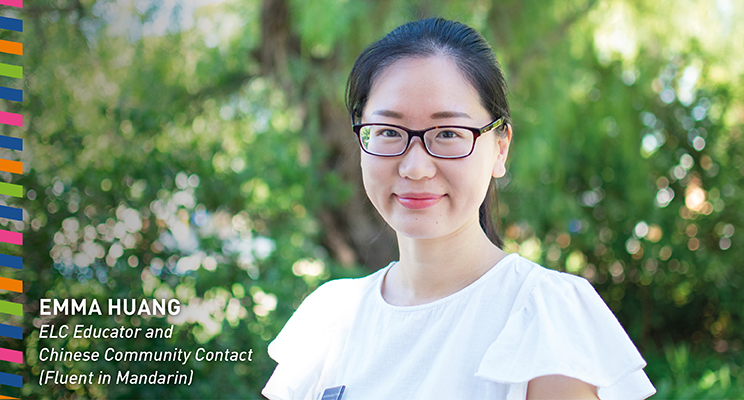
亲爱的家长朋友们,
在这个学期,通过不断革新和繁盛的实践项目,我们可以真正实现我们的学习宗旨。小朋友们有机会跨社区的融入到他们的学习中去,也有机会和更多的小朋友、老师们一同学习。通过我们“语言交响曲(SOL)”教师团队的努力,小组的教学调研得以深入。小朋友们通过使用他们的“创造语言”尽情地表达了他们的想法和主意。同样地,通过“舞蹈动作”—–肢体语言,这一种特别的表达性语言来叙述他们的故事。
欢迎Miss Simeonakis加入我们学习社区一单元来。Miss Simeonakis每周一到周五上午11点到下午6点都在学习社区1里工作。她是一个十分热情和有朝气的教师,她正在攻读早期儿童教育的学士学位。
在这里我们代表ELC的整个教师团队,十分感谢家长朋友们让我们拥有这么美好的一个学期,也期待我们下一个新学期的到来。
Emma works in Learning Community 2 on Mondays, Thursdays and Fridays from 9am – 5pm.
Friends of the ELC Wine Fundraiser
The Friends of the ELC are holding a wine fundraiser with all profits going towards the new ELC Community Garden and the 2020 Artist in Residence program.
As you may be aware, the ELC Community Garden will be a key educational tool for our young students, and will assist with starting conversations about ecosystems, sustainability and our individual carbon footprint. Involving the children in the creation and maintenance of a community garden not only engages them, but also provides a rich social and environmental learning experience.
The ELC’s annual Artist in Residence program allows the children to engage and collaborate with a local artist, helping to create something for the Centre and involving them in every step from the initial idea to the final development. This helps build deep connections to the Centre and each other as they collaborate to achieve a common goal.
You can support our fundraising cause by purchasing premium wines at prices well below the recommended retail price. Delivery is well-timed, just a few weeks shy of the festive summer/Christmas period. You can further support our fundraising cause by sharing the order form with your friends or relatives, who can also take advantage of the wonderful wines on offer at amazing prices.
There will be both pick-up and delivery options available which will be advised upon receipt of the order forms. You can download an order form here. They need to be returned to ELCwinefundraiser@commuserv.com.au no later than Wednesday 23 October. There is only a limited number of each of the wines available, so please complete your form and return as soon as possible to avoid disappointment.
Maria Caruso
President, Friends of the ELC
Learning Community 1
News from the Stonyfell Room
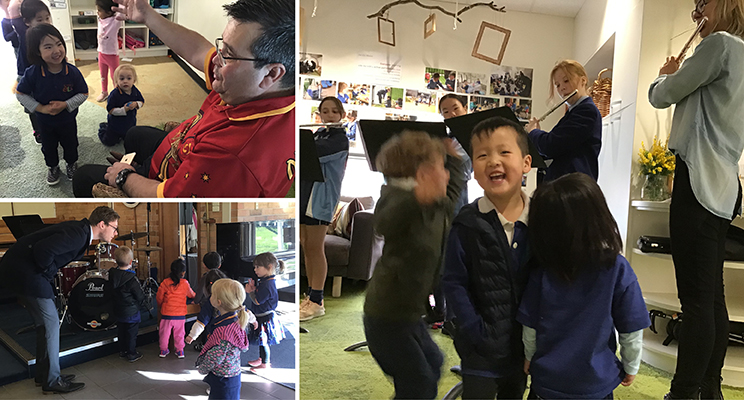
At St Peter’s Girls’ ELC, we are fortunate to have access to a wide variety of resources and people in the community who we can draw upon.
Last Friday morning in Learning Community 1, we were thrilled to welcome the very beautiful flute ensemble from Years 6, 7 and 8, accompanied by their tutor Karen Fletcher. The ensemble played some well-known favourites such as ‘Mamma Mia’ and ‘Somewhere Over the Rainbow’. The atmosphere created by the musicians as families entered at the beginning of the day was enchanting and soothing. Children from all over the Centre came to join us to share in the magic.
We have also had the privilege of visiting the Chapel every second Wednesday, accompanied by our School Chaplain, Mr Bassett. This beautiful building, with its rainbow coloured windows and high ceilings, is a chance for us to feel a sense of tranquillity and wonder, and to get to know another place and person in our community.
Beyond the school gates, we are very fortunate to have a strong relationship with Kaurna elder Tamaru. When the children hear the sound of his clapsticks they run eagerly to greet him with ‘Niina Marni!’ (how are you?). Tamaru has told us that it is incredibly humbling for him to hear the children speaking to him in his own language. We are proud of the way the children have embraced the Kaurna language and culture, of how they share their understanding and knowledge with their families; they are a promise for the future of living together among all Australians as a tolerant, respectful community.
We also wish to acknowledge the powerful work we have done together with you, the families, this term. I would like to thank all of you who have attended the important events we have hosted, including Parent-Teacher Conversations in which we celebrated the achievements of your child; the Grandparents and Special Friends’ afternoon opening our Community Garden; and the Fathers and Special Friends’ Breakfast. It is through all of these times that we deepen our connections and strengthen our community.
Mel Angel
News from the Bell Yett Room
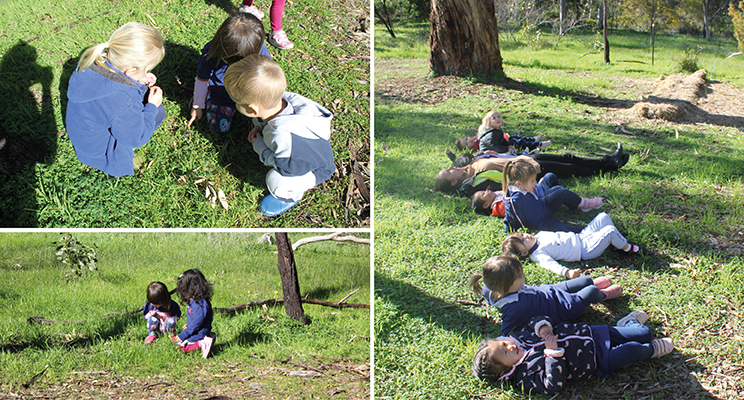
Our Story-Walks in Ferguson Park
On our visits to Ferguson Park throughout Term 3, we have been creating our own stories about the park and learning new ones from our Kaurna elder Tamaru. As we continue to deepen our Aboriginal language and cultural understanding, we have begun learning about many of the special spaces, trees and animals in the park that have a unique story, many years old. We would love to share them with you!
From Tamaru, we have learnt that kulus (koalas) sleep in male eucalyptus trees and eat from female eucalyptus trees. When our children shared their concern over kulus sleeping on ‘skinny’ branches, Tamaru explained that the kulus pick those branches because they rock in the breeze, helping them to fall asleep.
We have learnt about which leaves from certain bushes can be used for medicinal purposes, and which have leaves and branches that can be used to create bracelets. The children in Learning Community 1 now call the bracelet-making bush the ‘Birthday Present’ bush, gifting each other their creations.
As we experience the changes in Ferguson Park from winter to spring, we have researched and learned which wild flowers are okay to pick because they are in fact introduced weeds. We know which plants need our special care to be looked after and to continue growing. Tamaru has helped us to identify which animals have visited each tree by carefully studying the scratch marks at the bottom.
Like the Aboriginal culture, we are passing on knowledge through story. Our children have begun telling the stories to each other and creating their own theories about their learning:
“The Aboriginal people lived in my home before me.” – Stella
“You can eat this spikey leaf for a tummy ache.” – William L to Spencer
Our confidence has grown significantly in Ferguson Park and, as we enter Term 4, we will be embarking on walks a little bit further, tracking the path of the stories we tell. We will continue to work closely alongside Tamaru to learn stories and to understand how we can respect, care for and appreciate our land, inspired by the Kaurna people.
Annabelle Redmond
Learning Community 2
News from the Ferguson Room
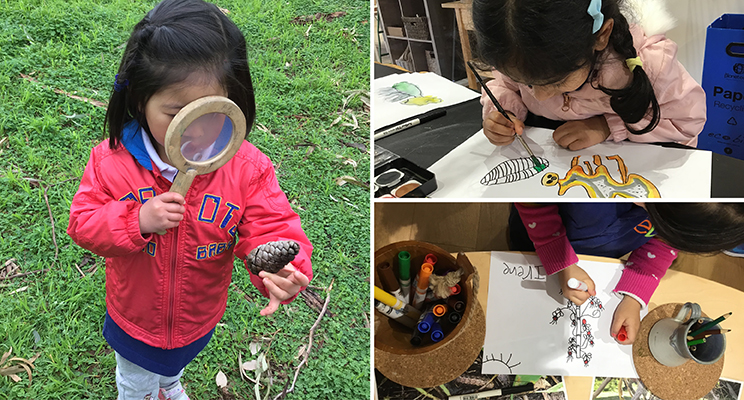
Our Term 3 Journey
“Learning is a process where knowledge is presented to us, then shaped through understanding, discussion and reflection.” – Paulo Freire
Reflection is fundamental to our learning cycle and it is imperative to look back in order to move forward.
This term began in Ferguson Park. It is such an important space for us; it offers such flexibility in our learning and always provides us with new provocations. We added a range of tools to support and shift our focus from the largeness of the park that we focused on in Term 2, to tuning in our gaze to uncover the smallness or the micro side of the park. With magnifying glasses, binoculars and iPads, we set out looking for the living creatures that inhabit the park. They often were hidden from us, and we needed to search under the leaf litter and in the bark to find them. What we found was a world of living creatures, many we were unable to identify, so we began to give them new names. Every interaction was led by the guiding words of Tamaru and enacting our Acknowledgement to Country:
“We will look after everything on the land.”
A few weeks passed by and the ELC Community Garden was completed, and the children were invited to connect with this new space. Over a few days, the discovery of a small stripy caterpillar captured the children’s interest. Then it wasn’t just one caterpillar but many, many caterpillars – maybe even a hundred! What occurred next was the children actively transferring and adapting the skills they have gained from the park into the ELC Community Garden. The Acknowledgement was quoted, Tamaru’s voice fuelled our interaction with the caterpillars and they truly became our friends, some even said “our best friends.”
We researched and discovered the species of the caterpillar is a Pine Looper, and the children questioned their veracious appetite as they began consuming the few plants growing in the space. This was another pivotal opportunity for learning to occur. We faced an ethical dilemma: could the caterpillars stay or would they need to go?
The solution came in the form of a wonderful Grandfather, Jeff. He reassured us that they would be okay to remain in the garden and could not possibility eat everything! The children engaged in further research and discovered that the caterpillars would not turn into butterflies as they had first hypothesised but rather into moths. Many questions followed:
- What is a moth?
- What is the difference between a moth and a butterfly?
- Why have we not seen them?
Alongside this exploration, the children have also been researching what we could plant in the garden. The discussion was made to plant tomatoes but we needed to find out more. The children have become tomato experts; they have created many representations of the plants and the various aspects that make up a tomato plant.
This term has been such an exciting and authentic journey for us and the children. The learning and involvement from the children in our community has been outstanding. We have seen the children’s fine motor skills develop, and their ability to research and collaborate strengthen. We are looking forward to now planting tomatoes and actioning our research by tending to and caring for these plants, and we hope to be successful.
Watch this space!
Laura Reiters
News from the Hallett Room
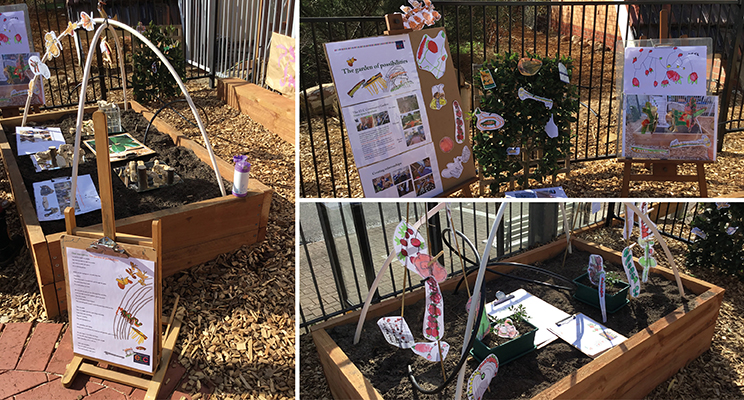
Only 10 weeks ago, we entered our new ELC Community Garden space. Unsure what we would find, we invited the children to embrace the environment with all of their senses. As they waited and watched, exploring both the man-made and natural features, this empty space became a place, a ‘garden of possibilities’.
The children were delighted to find a community already established within our ELC Community Garden, a community of caterpillars. They observed, researched and merged their imagination and knowledge to intimately know the Pine Looper caterpillar. Through a variety of expressive languages, including drawing, painting, clay, collage, dance and storytelling, the caterpillars – although now gone – will live on in the children’s memories.
“When are we planting? What are we going to plant?”, were the two questions we were greeted with on a daily basis. As we investigated the children’s wishes and the seasonal aspects of an edible garden, the children learnt to be patient as they waited for the soil to warm. We embraced this gift of time as an opportunity and researched our future plants, creating a deep understanding of them, and connection to them, as a living thing that we will nurture but that will also nurture us.
In these 10 short weeks, the ELC Community Garden has become a place for connecting. At the launch of the garden, we observed our community strengthen its relationships, not only to the garden but between our families and friends, and our relationships with our wellbeing, culture, history, ecological identity and sustainable thinking. Our ‘garden of possibilities’ – although still not bearing edible offerings – has already gifted us so much.
Nell Tierney and Leanne Williams
